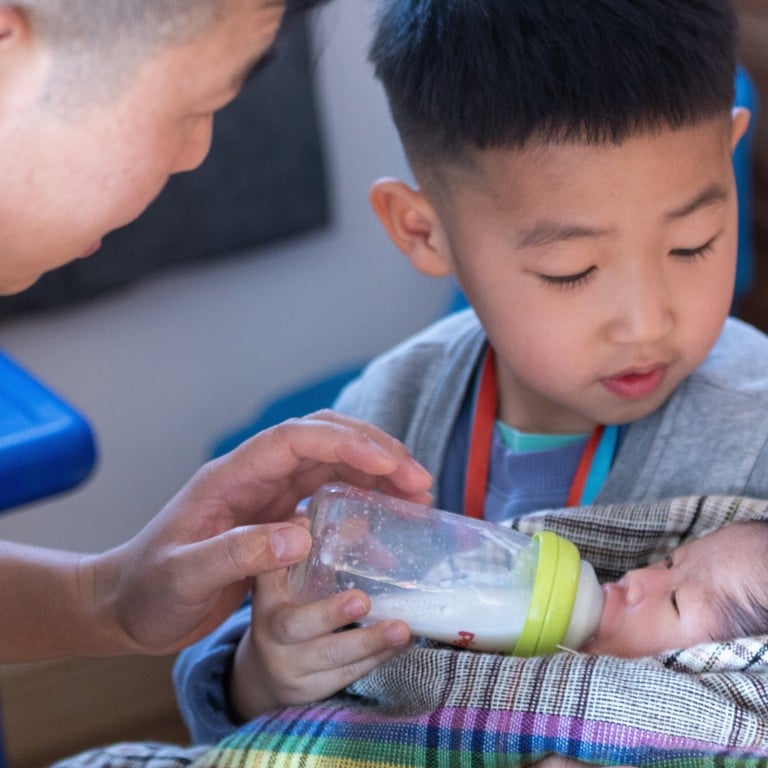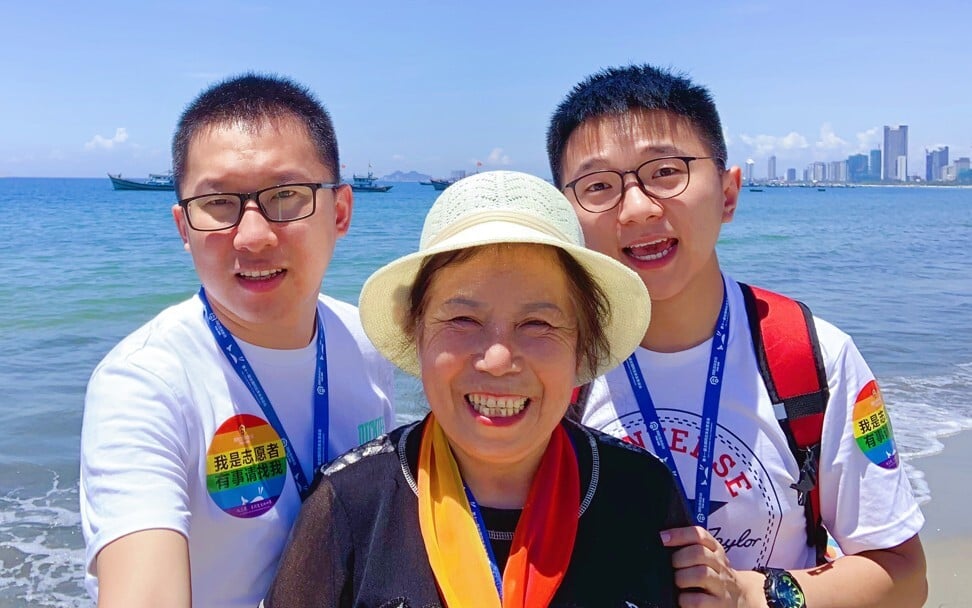
China’s LGBT parents find family and joy through surrogacy
- Chinese operating in a legal grey area are looking to Southeast Asia, eastern Europe and even the US for surrogates
- Call for greater regulation as demand by would-be parents grow and advocates voice concern for the welfare of surrogate mothers
On a spring day earlier this year Carson Lei held the hand of his 16-month-old son as the toddler learned to navigate a sandy beach in southern China.
The child was faltering as he tried to walk but helping him along was not only Lei but also the businessman’s seven-year-old son.
The two children have different biological parents but they have enabled Lei, who lives in Dongguan in Guangdong province, to create a family that has eased the years of pain he felt about being misunderstood and not accepted by mainstream society.
Lei, 40, is gay and had already unofficially adopted his first child, a biological nephew, when he turned to surrogacy for a second child.

Aside from sham marriages between gay men and lesbians, commercial surrogacy was the only option, said Ah Qiang, director of the Guangzhou-based organisation PFLAG, an organisation for lesbian, gay, bisexual, transgender and queer people, their families and allies.
“The existing adoption law is heterocentric and unfriendly to gay people. Generally, there is no way for gay people to adopt children domestically,” Ah Qiang said.
For those who can afford it, the United States is a popular choice. George Luo, who runs a surrogacy agency based in Guangzhou, Guangdong province, said it cost 1.4 million yuan (US$196,000) to have a surrogate child in the US.
Luo agency’s mostly finds mothers from Southeast Asia for his clients but competition from elsewhere has become fierce, with agencies offering services in countries such as Ukraine and Georgia.
“The number of surrogacy agencies has been growing sharply and there is no way to count the specific figures given that it’s underground,” Luo said, describing Guangzhou as the surrogacy hub of China. “There have been many instances where money was lost because of a bad intermediary.”
Lei, too, chose Southeast Asia, going to Thailand in the autumn of 2017 for what he hoped would be a final time to have a child through a surrogate service. Several previous attempts to find a surrogate and to have embryos successfully implanted had failed.
This time, before heading to the agency, he stopped in the heat of Bangkok at the Erawan Shrine in the centre of the city, knelt and prayed for the Buddha to bless him with a healthy child. His prayers were answered.
The surrogate mother flew to Guangzhou in her last month of pregnancy and was admitted to a private hospital for the birth, using the ID card of one of Lei’s friends.
“I think I am a lucky man, compared to gay men who have had to marry heterosexual women, causing pain on both sides,” Lei said, adding that he spent 550,000 yuan in all on the attempts.
Agency owner Luo said surrogates from other countries gave birth in China because medical care was often more advanced than in their home countries. It also ensured the child had a Chinese birth certificate, making it easier to register for a hukou, a residence permit that gives holders access to health care, education and other social security benefits.
Legally, surrogacy is a grey area in China, as it is neither permitted by law nor is it explicitly prohibited.
The biggest hurdle in the past has been that children born out of wedlock were not granted a hukou. This changed when authorities relaxed laws in 2016, the same year that China – under the pressure of declining fertility rates and an ageing population – revised regulations to allow families to have two children.
There have been calls for legislation to regulate non-commercial surrogacy, which is a positive response to the high demand, according to Ke Qianting, an associate professor studying gender equality from Sun Yat-sen University in Guangzhou.
“The legislation is not about encouraging surrogacy, but punishing those who violate the law and protecting those who do it legally,” she said.
“In fact, the countries where surrogacy is legal follow the principle of ‘mutual assistance in childbirth’ and outlaw purely commercial surrogacy, which treats the mother’s body as instrumental and commercial, and that’s inhumane.”
However, Ke does not agree with views that surrogacy is nothing but the exploitation of a woman’s body.
“Considering women as only victims, and not being able to distinguish between specific situations, is a failure to see the autonomy they have over their own bodies,” she said.

Despite the challenges faced by LGBT people trying to have a baby, activist Ah Qiang said societal attitudes towards the community had improved.
“More people are coming out from the closet now than there used to be, as society has become more accepting of gay people, but same-sex marriage is not yet approved in China,” he said.
“Living with homosexuality as a social identity is a reflection of the progress of society. A new generation of sexual minorities are less repressed and ‘abnormal’, less secretive, more open and upright, speaking out with family, friends and colleagues.
“It’s a change of times, quite different from 20 years ago. LGBT people also have the right to pursue a happy life.”
Wei Wei is a professor of sociology at East China Normal University and has studied LGBT issues for more than 20 years.
Wei said that 10 years ago no one in the LGBT community talked about having children but now, “working hard to save money to have surrogate babies is a hot topic in the community and the demand is very high, especially for gay men”.
“Because Chinese parents have the idea of passing on the family line, bearing offspring through surrogacy has also become a catalyst for the gay community to come out to their parents and be accepted.”
Lei is an example of that.
“My two children and I are living with my parents. They are busy taking care of kids and are very happy every day. They don’t care much about my sexual orientation any more,” Lei said.

